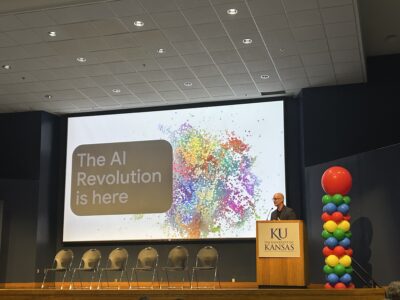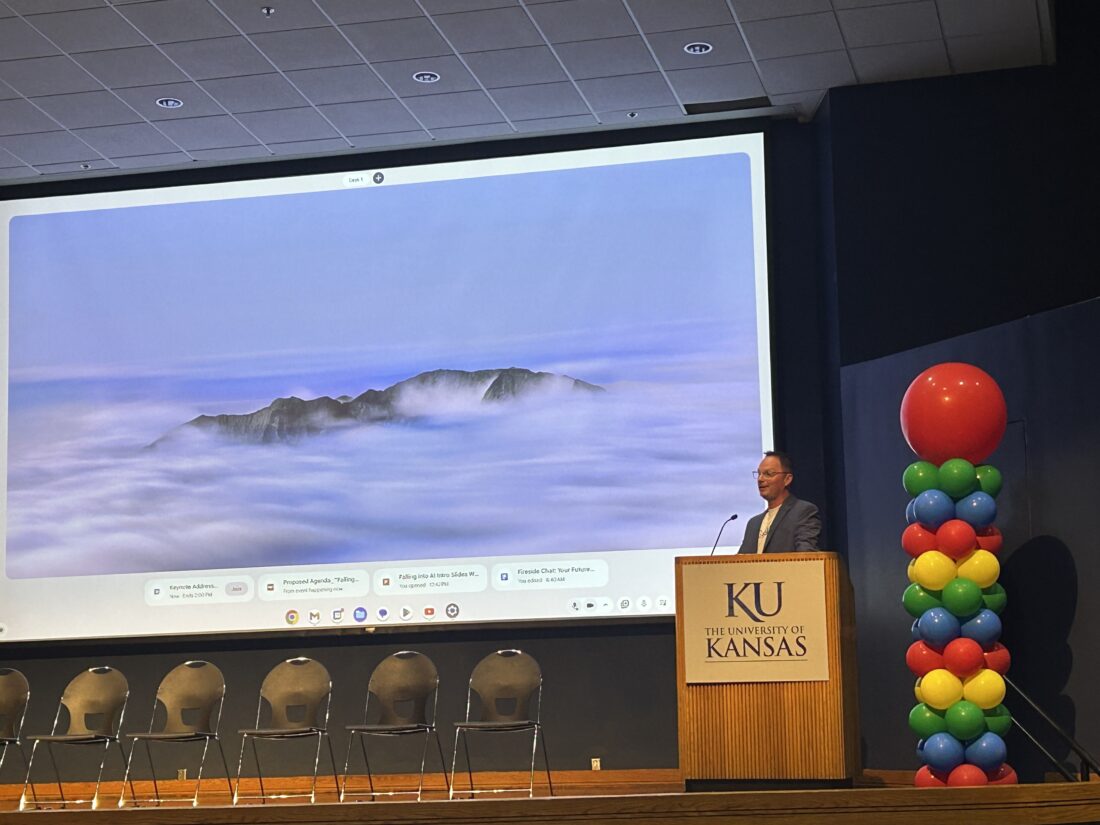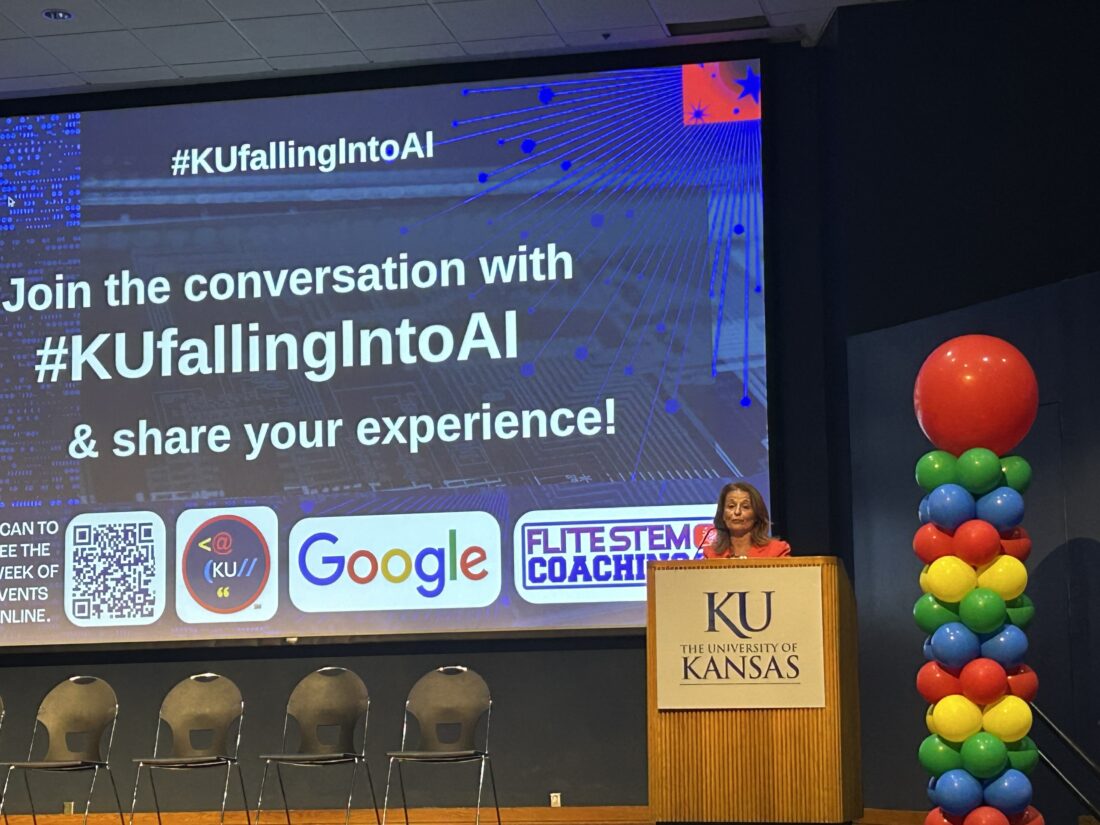Amid ‘AI Revolution,’ weeklong series at KU includes Google experts on how AI can be a partner for improving education

photo by: Bremen Keasey/Journal-World
During Monday's keynote presentation for KU's "Falling Into AI" summit about AI and its role in education, Chris Daugherty, an education and strategy lead at Google Cloud, discussed how they hope their unique AI tools and infrastructure can help researchers make breakthroughs.
Whether you like it or not, “The AI revolution is here,” Chris Daugherty, of Google Cloud, told a University of Kansas audience Monday.
Daugherty was one of the keynote speakers at the opening event for KU’s “Falling into AI” summit, which will feature a week of events that explore artificial intelligence in education, research and professional practice.
The series, which is being led by KU’s Flexible Learning through Innovations in Technology & Education, or FLITE, and KU Information Technology, kicked off with Google employees discussing how their work in AI research can be a useful tool in education.
Jeremy Dautenhahn, with Google’s South Central Public Sector, noted that the company has had a key partner in Kansas. Google Earth was invented by Lawrencian Brian McClendon; Kansas City, Kansas, was the first city to get Google Fiber internet; and the company invested around $2.1 billion last year in the Kansas economy, Dautenhahn said.
Dautenhahn said that more people have access to Google’s Gemini AI, a generative artificial intelligence chatbot, through Android cellphones across the world than access to wastewater systems, so people “need to take this technology seriously” as a potential problem-solver.

photo by: Bremen Keasey
Jeremy Dautenhahn, a Google Leader for its South Central Public Sector, noted during Monday’s keynote speech for KU’s “Falling into AI” summit that Google and Kansas have had a strong partnership. The weeklong summit aims to help demonstrate how KU’s faculty and students can integrate AI tools into academics.
Many of the “Falling into AI” events at KU will discuss the impact of AI on higher education and finding ways to make the best use of it. Daugherty noted that according to Google’s data, 92% of college students said they had used AI in some capacity — a much higher number than for faculty members.
Part of that might have stemmed from the immense push in the commercial world to integrate AI, but the growth in AI usage is only expected to continue. Daugherty said it is estimated that by 2027 60% of jobs will require certain AI skills, and Google hiring already asks applicants about AI use, highlighting how understanding the basics of using AI could become crucial for students to learn.
While that data might cause some alarm for academics, Lisa Dieker, a professor of special education at KU’s School of Education and Human Sciences and director of FLITE, said it was important to think about how to find ways that humans and technology can come together. Dieker asked audience members to think of their favorite teacher from the past and said that human inspiration, like the kind they got from a special instructor, wouldn’t be supplanted by AI but could be enhanced by it with the right tools.

photo by: Bremen Keasey
Lisa Dieker, a Professor of Special Education at KU’s School of Education and Human Sciences and Director of FLITE, said during the keynote event for KU’s “Falling into AI” summit Monday afternoon that AI can be a key tool for educators, not something that will replace their role.
“AI is the tool; teachers are the heart,” Dieker said.
Dieker told the Journal-World that one of the aims for the weeklong event is to bring together the people across “KU’s spread-out campus” who were working with AI. Solving complex problems with AI takes a “transdisciplinary approach” that interweaves multiple experts together so that the departments are “learning from each other.”
Dieker, who wants to host a similar event every year, said she hoped that this partnered event with Google could spread the word.
“We are already an AI leader; let’s make it more public,” Dieker said.
Daugherty said that Google, unlike some tech companies, does not train on customer data, which can make it safer to use in a research environment that might need to follow privacy guidelines like the Health Insurance Portability and Accountability Act, or HIPAA. Daugherty said that the company’s biggest goal was to serve as a partner for making innovations through its AI software and that innovations found at KU would belong to KU.
“If the best new idea comes from this campus and changes the world, that (idea) is yours to keep,” Daugherty said.
Along with Monday’s keynote speeches, the day’s events included a panel discussion with Google experts and breakout sessions that focused on specific areas for AI use.
Events throughout the week are free to anyone but are intended for the KU community. Open houses will include in-person and virtual options, with treats, prizes and giveaways available for in-person attendees. A full list of events is available on KU’s website. The summit will run until Friday.







